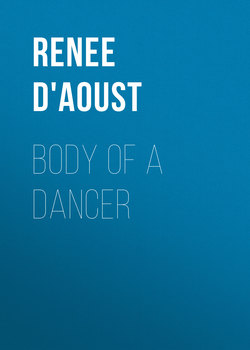Читать книгу Body of a Dancer - Renee D'Aoust - Страница 14
На сайте Литреса книга снята с продажи.
The mind . . .
ОглавлениеThe modern dancer’s mind is just as twisted as the ballet dancer’s mind. She thinks she is too tall, too short, too fat, too thin (oops, never too thin), too blonde, too brunette, too pale, too dark, too, too, too something to be a dancer. She is wrong for the part. She is not wrong for the part. Her body is wrong for the part. But her body is her. There is absolutely no difference. Her body is the instrument, and she is the instrument.
When I moved to New York City in the summer of 1993, I wanted to get trained. Then, I thought, I’ll see what I want to do with a trained body. I was twenty-five-years old. Old for a dancer. Even a modern dancer. After eight years training in ballet as a kid, I’d left ballet at the age of sixteen. I declared I wanted a broader focus to my life, but it was also true that I had started to realize I would not become a principal or even a soloist, and I didn’t want to be part of the corps. Maybe in a different era, Margot Fonteyn’s era, I could have made principal. Danced Swan Lake. Maybe not. For a while after ballet, a broader focus took over. I finished high school, then traveled, held different jobs, and briefly went to university without completing a degree. I had the opportunity to come back and dance again. Myra Woodruff gave me the chance.
New York City. I was willing to bleed for my art. But I wasn’t willing to die for it. I made a distinction in my mind because I’d seen death at the Pacific Northwest Ballet School. I’d seen a woman who was skin and bones, a woman who was a warning to my dancing life. I’d seen her, and I remembered her. I never knew her name, but I saw each rib. I saw her collar bones. I saw the protrusion of each vertebra. She had no pubic hair.
I’d seen the hollows of her eyes. She had looked me directly in the eye in the dressing room. I was ten years old. She must have been sixteen or eighteen or maybe even twenty. She’d looked at me, and I had stared back, and I had heard her words in my head, “I am dying.” I remembered.
My mother had seen this girl, too, and delayed my enrollment at the Pacific Northwest Ballet School for an entire year because of it. My mother figured that if there was a skeleton walking around Pacific Northwest Ballet, it was not the sort of dance school she wanted her daughter to attend. Instead, I enrolled at the Cornish School of the Arts and trained with Noël Mason, who had danced with the Joffrey Ballet. When Ms. Mason moved from Cornish to Pacific Northwest Ballet School a year later, I followed. For the next three years after that, I was “Clara” in The Nutcracker—Michael Smuin’s version, not the Kent Stowell and Maurice Sendak version.
Francia Russell, the director of the school, said to me, “You’re perfect for ‘Clara,’ because you are much more of an actress than a dancer.”
It was a condescending compliment. I couldn’t handle her honesty, but I did appreciate it. That’s why, at sixteen, when Francia Russell told me the most I could hope for as a ballet dancer was as a corps member in some Midwestern third-tier company, I decided to quit. My excuse was that I would act. But really, something inside died. An ex-dancer knows what I mean. When I left ballet, I left my identity. None of my dance classmates phoned. I had succumbed to failure. I did not have the biology. My extension was not high enough. I had breasts. I would never be a ballet dancer. I was nothing.
At the age of twenty-five, I had a lot to prove as a modern dancer. But I had placement and turn-out and good arches and musicality and presence. Ballet had given me all that. I was ready—in modern—to learn. I worked harder than all my classmates. I had lost years. I couldn’t waste a second.
In the summer of 1993, I felt I’d been given a second chance. I was home. In my body. In the body of a dancer. Or what would soon be the body of a dancer. There was much to do: shape the thighs; get the turnout working again; get the extension going; develop strength; balance. And jump. And land without hopping. God, I loved to jump. To leap. To fly to the sky and never ever land. To take to the heavens. The blue expanse holds me there.
